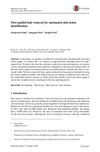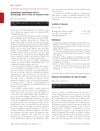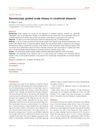 November 2020 in “Journal of Bioengineering and Technology Apllied for Health”
November 2020 in “Journal of Bioengineering and Technology Apllied for Health” COVID-19 affects multiple body systems and complicates treatment; accurate testing is crucial.
53 citations,
January 2013 in “Journal of toxicologic pathology” The project created a standardized system for classifying skin lesions in lab rats and mice.
 47 citations,
September 2022 in “European Heart Journal”
47 citations,
September 2022 in “European Heart Journal” Women may need different blood pressure guidelines than men for heart disease prevention.
33 citations,
May 2015 in “JAMA Dermatology” Early detection of specific skin lesions can help identify Birt-Hogg-Dube syndrome and prevent serious complications.
18 citations,
August 2013 in “Journal of Feline Medicine and Surgery” Cats can get skin issues from things other than fleas, like insect bites, food, or allergens.
16 citations,
August 2017 in “Lupus” Chronic cutaneous lupus erythematosus should be considered when acne treatments don't work.
15 citations,
January 2023 in “Antioxidants” Oxidative stress plays a significant role in alopecia areata, and new treatments may include JAK inhibitors and antioxidants.
 8 citations,
September 2022 in “Human genomics”
8 citations,
September 2022 in “Human genomics” Key genes and pathways involved in thyroid eye disease were identified, aiding potential treatment and diagnosis.
5 citations,
July 2023 in “Microorganisms” The study found specific skin and cell changes in patients with monkeypox, helping diagnose and understand the disease.
1 citations,
April 2024 in “Pathogens” A pet ferret had a serious infection from Mycobacterium xenopi, which can spread to humans.
 1 citations,
October 2023 in “Veterinary Dermatology”
1 citations,
October 2023 in “Veterinary Dermatology” Transversal biopsy sections are better than longitudinal sections for diagnosing alopecia X.
 1 citations,
January 2023 in “Biochemical and biophysical research communications”
1 citations,
January 2023 in “Biochemical and biophysical research communications” Keratin 79 is linked to liver damage and may help diagnose liver diseases.
 1 citations,
May 2021 in “BMC Proceedings”
1 citations,
May 2021 in “BMC Proceedings” The document concludes that more research is needed to reduce frequent hospital visits, addiction medicine education improves with specific training, early breast cancer surgery findings are emerging, nipple smears are not very accurate, surgery for older melanoma patients doesn't extend life, a genetic condition in infants can often be treated with one drug, doctors are inconsistent with blood clot medication, a certain gene may protect against cell damage, muscle gene overexpression affects many other genes, and some mitochondrial genes are less active in mice with tumors.

Celiac disease requires more than just a gluten-free diet for effective management.
 January 2025 in “Cellular & Molecular Biology Letters”
January 2025 in “Cellular & Molecular Biology Letters” Eicosanoids are crucial for skin health, and targeting their pathways may help treat skin conditions.
 September 2024 in “The Neurohospitalist”
September 2024 in “The Neurohospitalist” Careful management of chronic hyponatremia is crucial to prevent severe neurological issues.
 September 2024 in “Journal of Investigative Dermatology”
September 2024 in “Journal of Investigative Dermatology” A new tool can analyze hair to detect changes due to hormones, genetics, and aging.
 June 2024 in “Skin Research and Technology”
June 2024 in “Skin Research and Technology” hsa-miR-193a-5p may help diagnose and treat alopecia areata.
 May 2023 in “Experimental Dermatology”
May 2023 in “Experimental Dermatology” RCM and OCT are effective for diagnosing and monitoring hair-related skin diseases but lack standardized protocols and need more research.
January 2022 in “Clinical Cases in Dermatology” Scalp psoriasis is hard to treat and may need various medications.
January 2021 in “Clinical dermatology review” Teledermatology is crucial and effective for remote skin care in India.
 6 citations,
January 2018 in “Multimedia Tools and Applications”
6 citations,
January 2018 in “Multimedia Tools and Applications” The new method removes hair from skin images quickly and accurately to help identify skin lesions better.
1 citations,
January 2022 in “Journal of veterinary diagnostic investigation” A British Bulldog had a unique viral plaque caused by Canine papillomavirus 18, different from typical tumors.
 February 2018 in “British Journal of Dermatology”
February 2018 in “British Journal of Dermatology” We need better research to improve alopecia treatment and patient care.
 January 2015 in “Springer eBooks”
January 2015 in “Springer eBooks” The document concludes that managing PCOS involves lifestyle changes, medication, and monitoring for associated health risks.
 62 citations,
March 2012 in “Journal of the European Academy of Dermatology and Venereology”
62 citations,
March 2012 in “Journal of the European Academy of Dermatology and Venereology” Using dermoscopy to guide scalp biopsies is an effective way to diagnose cicatricial alopecia.
 273 citations,
May 2017 in “The Lancet”
273 citations,
May 2017 in “The Lancet” Some drugs can cause rare but potentially deadly skin reactions, and early treatment and avoiding the drug again are key.
 258 citations,
July 2016 in “Reproductive Biology and Endocrinology”
258 citations,
July 2016 in “Reproductive Biology and Endocrinology” The document concludes that insulin resistance is key in PCOS development and early treatment is crucial to prevent complications.
 200 citations,
October 2009 in “European journal of endocrinology”
200 citations,
October 2009 in “European journal of endocrinology” Metformin helps manage polycystic ovary syndrome by improving insulin resistance and ovulation, but more research is needed on its full effects.
 152 citations,
January 2004 in “Current anthropology”
152 citations,
January 2004 in “Current anthropology” Humans lost body hair relatively recently in evolution.




















